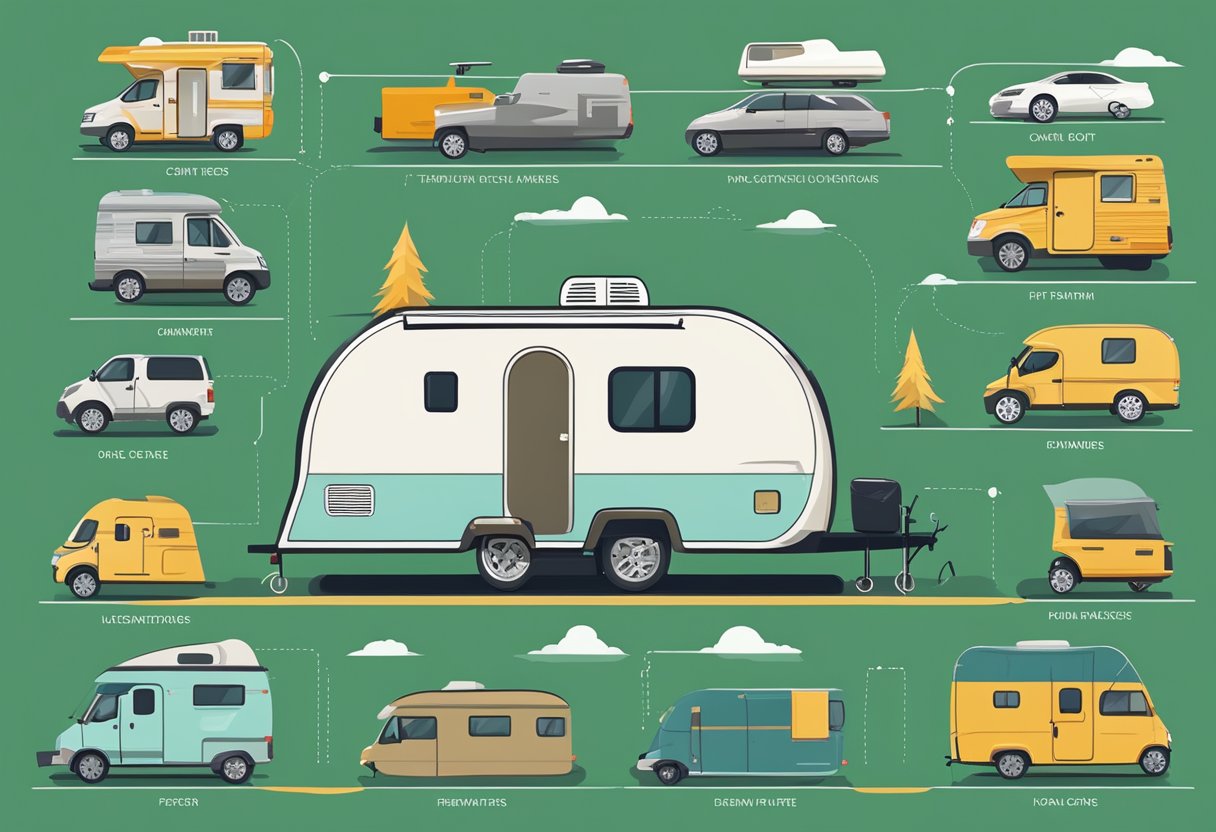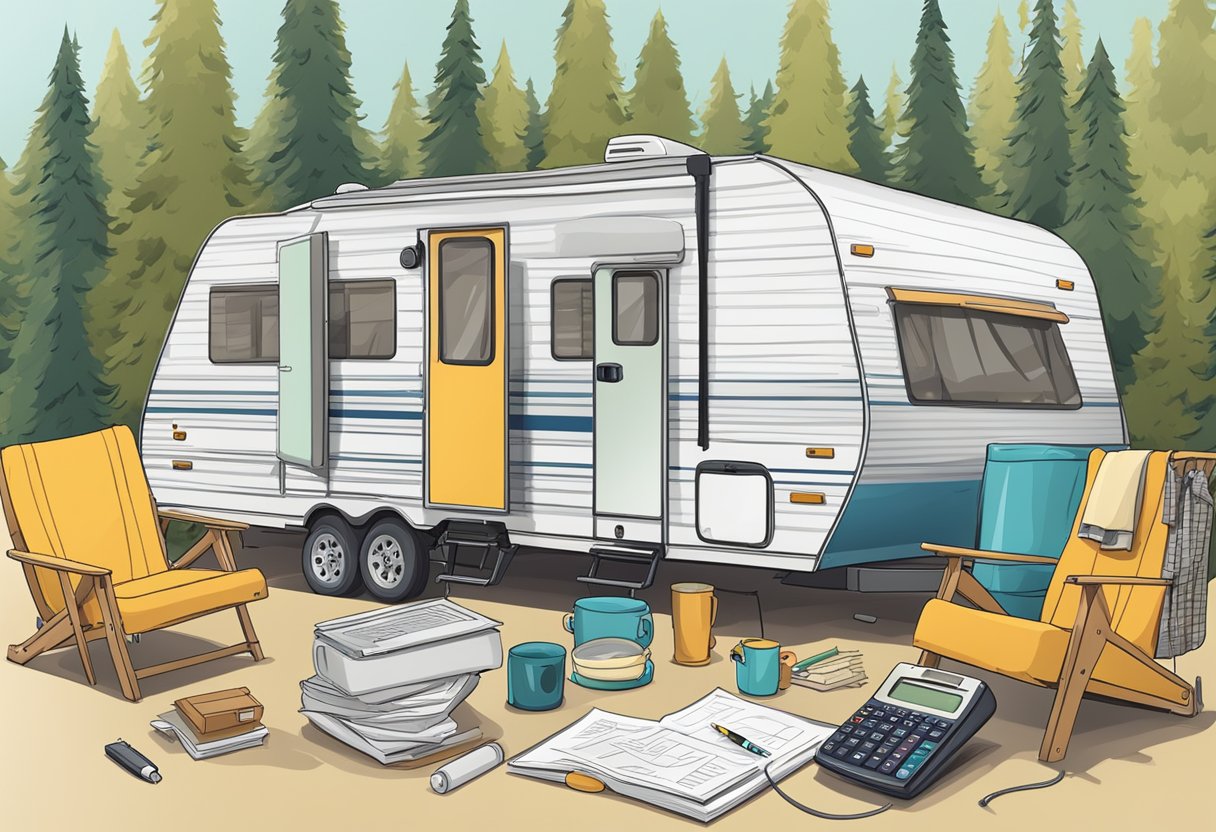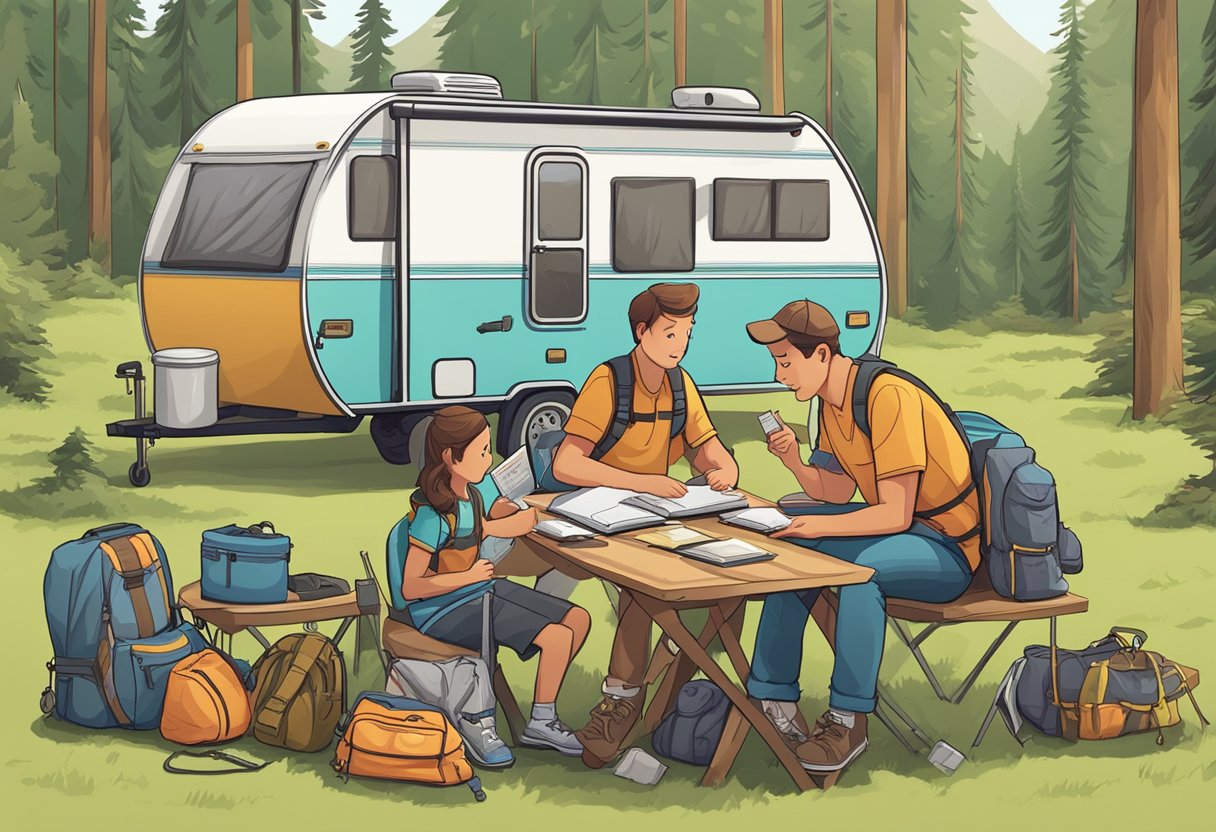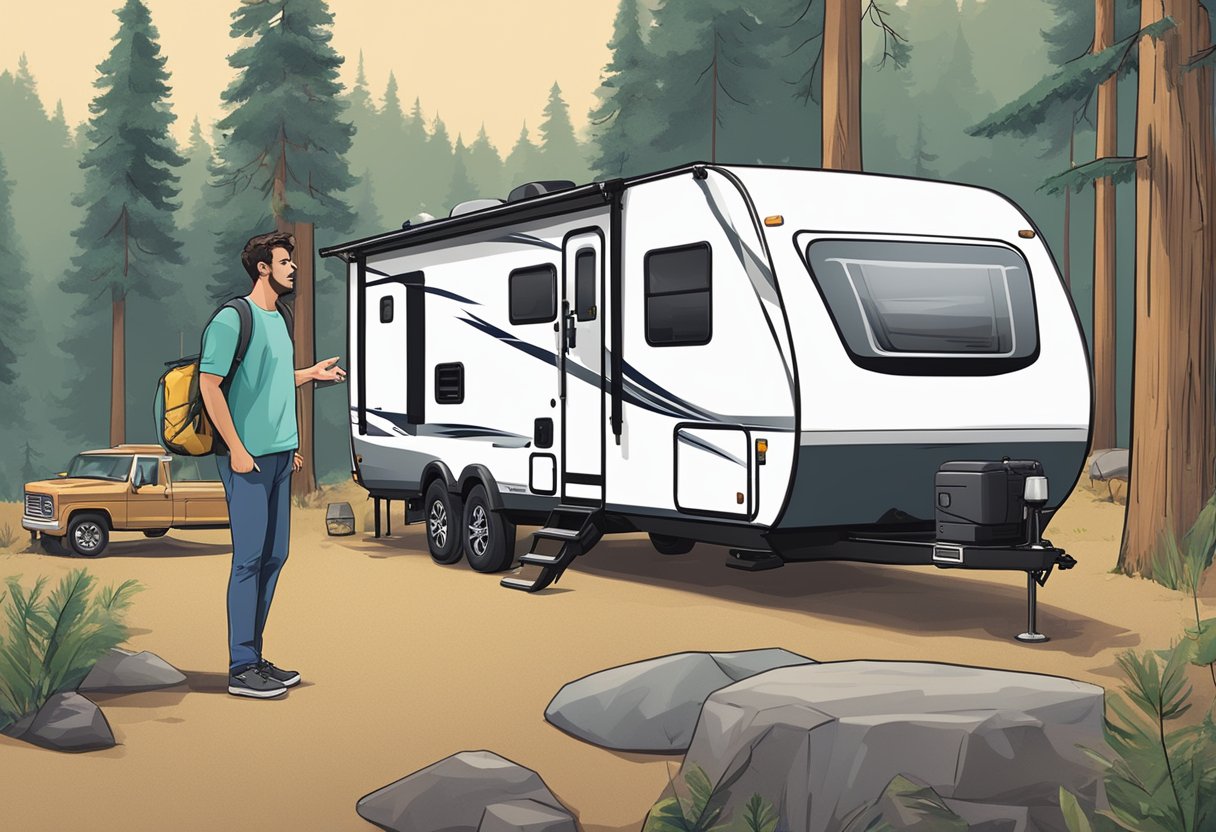Renting a camping trailer is a great way to experience the great outdoors without sacrificing the comforts of home. However, the cost of renting a camping trailer can vary widely depending on a number of factors. In general, the cost of renting a camping trailer will depend on the size and type of trailer, the length of the rental period, and the time of year.

When it comes to the size and type of trailer, smaller and simpler trailers will generally be less expensive to rent than larger and more luxurious ones. For example, a basic pop-up trailer may cost as little as $50 per night, while a larger travel trailer with all the bells and whistles could cost upwards of $200 per night. Additionally, the length of the rental period will also impact the cost, with longer rental periods generally resulting in lower nightly rates. Finally, the time of year can also impact the cost of renting a camping trailer, with peak season rates often being significantly higher than off-season rates.
Understanding RV Rental Costs
When it comes to renting an RV, the cost can vary depending on several factors. In this section, we’ll break down the most important factors that affect the cost of renting an RV.
Rental Period
One of the most significant factors that affect the cost of renting an RV is the length of the rental period. Typically, the longer the rental period, the lower the daily rate. For example, renting an RV for a week may cost less per day than renting for only a weekend. Some rental companies may also offer discounts for longer rental periods.
Type of RV
Another factor that affects the cost of renting an RV is the type of RV. There are several types of RVs available for rent, including motorhomes, travel trailers, fifth wheels, pop-up campers, and camper vans. Motorhomes are generally the most expensive type of RV to rent, while pop-up campers are usually the least expensive. Luxury RVs with amenities such as full kitchens, bathrooms, and entertainment systems will also cost more to rent.
Rental Company
The RV rental company you choose can also affect the cost of renting an RV. Some rental companies may charge higher prices for the same type of RV than others. Peer-to-peer RV rental platforms, such as RVshare and Outdoorsy, may offer lower prices than traditional RV rental companies like Cruise America. However, it’s important to note that peer-to-peer rentals may not include the same level of customer support or insurance coverage as traditional rental companies.
In conclusion, understanding the factors that affect RV rental costs can help you make an informed decision when choosing an RV to rent. By considering the rental period, type of RV, and rental company, you can find the best RV rental for your budget and needs.
Factors Influencing Rental Prices

When it comes to renting a camping trailer, there are several factors that can influence the price. By understanding these factors, renters can make more informed decisions and potentially save money on their rental. The following subsections describe some of the most important factors that influence rental prices.
Location
Location is a significant factor that can affect rental prices. For example, renting a camping trailer in Denver, Colorado, may be more expensive than renting one in Portland, Oregon. This is due to various factors such as demand, competition, and availability. Moreover, some locations may have higher taxes or fees that can increase the overall cost of renting a camping trailer.
RV Age and Condition
The age and condition of the camping trailer can also influence the rental price. Newer models with modern amenities and features will generally be more expensive to rent than older models with basic features. Additionally, well-maintained trailers in good condition may cost more to rent than those that are older and in poor condition.
Mileage and Gas
Mileage and gas are other factors that can impact the rental price. Renters should be aware of the mileage limits and any additional fees associated with exceeding those limits. Furthermore, the cost of fuel can vary depending on the location and fuel economy of the camping trailer. Renters should consider the distance they plan to travel and the estimated fuel costs when budgeting for their rental.
In summary, several factors can influence the cost of renting a camping trailer. These factors include location, RV age and condition, and mileage and gas. Renters should consider these factors when making their rental decisions to ensure they get the best value for their money.
Additional Rental Expenses

Renting a camping trailer comes with additional expenses beyond the nightly rental fee. These expenses can vary depending on the rental company and the location, so it is important to read the rental agreement carefully to understand what additional costs may be incurred.
Security Deposits
Many rental companies require a security deposit before renting out a camping trailer. The deposit is usually refunded once the trailer is returned in good condition. The amount of the deposit can vary depending on the rental company and the type of trailer being rented. It is important to read the rental agreement to understand the terms and conditions of the security deposit.
Insurance and Roadside Assistance
Rental insurance and roadside assistance are additional expenses that may be required when renting a camping trailer. Rental insurance covers damages to the trailer during the rental period, while roadside assistance provides help in case of a breakdown or other emergency. These expenses can vary depending on the rental company and the type of trailer being rented.
Cleaning Fees and Taxes
Cleaning fees and taxes are additional expenses that may be incurred when renting a camping trailer. Cleaning fees are charged if the trailer is not returned in the same condition it was rented in. Taxes are charged on the rental fee and any additional expenses. These expenses can vary depending on the rental company and the location.
It is important to read the rental agreement carefully to understand what additional expenses may be incurred when renting a camping trailer. This will help avoid any surprises and ensure a smooth rental experience.
Budgeting for Your RV Trip

When planning an RV trip, budgeting is an essential part of the process. This section will provide tips on how to estimate total rental cost and save on rental costs.
Estimating Total Rental Cost
The cost of renting an RV varies depending on the type of RV, rental location, and duration of the rental. According to a source, the average cost to rent an RV is $183 per night as of November 2023. This is based on a statistical sample, and the rates may vary depending on the type of rig rented.
To estimate the total rental cost, travelers should consider the following factors:
- Rental duration: The longer the rental, the higher the total cost.
- RV type: The cost of renting a Class A motorhome is usually higher than renting a Class C motorhome or a campervan.
- Rental location: The cost of renting an RV may vary depending on the rental location, as some areas may have higher demand than others.
Travelers should also consider additional costs such as insurance, fuel, and campground fees. Insurance is essential when renting an RV, and most rental companies offer insurance options. Fuel costs will depend on the distance traveled, the type of RV, and the fuel efficiency of the RV. Campground fees may vary depending on the location and amenities offered.
Saving on Rental Costs
There are several ways to save on rental costs when planning an RV trip. One of the most effective ways to save on rental costs is to rent an RV for a longer period. Many rental companies offer discounts for long-term rentals, which can significantly reduce the total rental cost.
Another way to save on rental costs is to rent during the off-season. Rental rates are usually lower during the off-season, and travelers can save money by renting during this time. Additionally, travelers can save money on campground fees by boondocking, which means camping in areas without hookups.
Travelers can also save money by towing their own travel trailer with their vehicle instead of renting an RV. Towing a travel trailer can be more cost-effective than renting an RV, as travelers do not have to pay for rental costs and insurance.
In conclusion, budgeting is an essential part of planning an RV trip. By estimating the total rental cost and finding ways to save on rental costs, travelers can enjoy the benefits of renting a travel trailer without breaking the bank.
Choosing the Right RV for Your Needs

When it comes to choosing the right RV for your camping trip, there are a few factors to consider. RVs come in different classes and types, each with its own set of features and amenities. In this section, we’ll discuss the different RV classes and types to help you make an informed decision.
RV Classes
RVs are typically classified into three categories: Class A, Class B, and Class C. Class A motorhomes are the largest and most luxurious, while Class B motorhomes are the smallest and most basic. Class C motorhomes are somewhere in between, offering a good balance of size and amenities.
Class A motorhomes are ideal for large families or groups of friends who want to travel in comfort and style. They typically have a full kitchen, bathroom, and living area, as well as multiple sleeping areas. Class C motorhomes are a good choice for smaller families or couples, as they offer many of the same amenities as Class A motorhomes but in a smaller package. Class B motorhomes, also known as camper vans, are the smallest and most basic type of RV. They are ideal for solo travelers or couples who want to travel light.
Towable RVs vs. Motorized RVs
RVs can also be classified as towable or motorized. Towable RVs are trailers that are towed behind a vehicle, while motorized RVs are self-contained and can be driven like a car.
Towable RVs come in a variety of types, including fifth wheels, toy haulers, pop-up trailers, and small travel trailers. Fifth wheels are the largest and most luxurious type of towable RV, while toy haulers are designed for those who want to bring along their ATVs, motorcycles, or other toys. Pop-up trailers and small travel trailers are a good choice for those who want a more basic camping experience.
Motorized RVs, on the other hand, come in two types: Class A and Class C. Class A motorhomes are the largest and most luxurious type of motorized RV, while Class C motorhomes are smaller and more maneuverable. Both types offer many of the same amenities as towable RVs, but with the added convenience of being able to drive them like a car.
In conclusion, when choosing the right RV for your camping trip, it’s important to consider your budget, the size of your group, and the amenities you require. Whether you choose a towable or motorized RV, and whether you opt for a Class A, B, or C motorhome, there is an RV out there that will meet your needs.